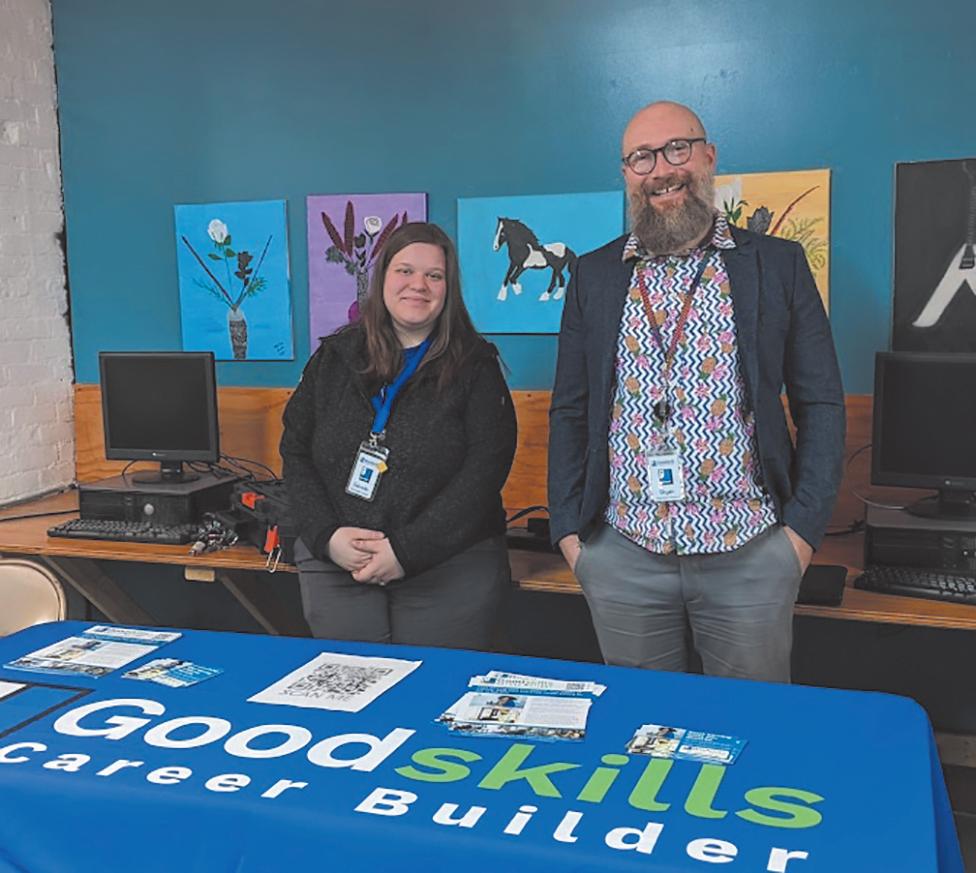
14 minute read
Goodskills Staff are Guests at MHA Recovery Luncheon
Jamestown, N.Y. – At the Mental Health Association in Chautauqua County’s (MHA) recent recovery luncheon in Jamestown, Executive Director Steven Cobb welcomed everyone with the reminder that being together is part of supporting recovery.
Staffers Roseann Crocker and Sienna Swanson joined Cobb in presenting certificates to a number of participants for accomplishments including completing the Positive Parenting Program, being accepted at Jamestown Community College, reaching their personal goals, and more.
Advertisement
Justin Jimenez, staffer of MHA’s OPEN Work Program, shared his song, “Give Me Your Eyes.”
Special guests at the luncheon were Gabby Rafan and Bryan Boleratz, community outreach liaisons with Goodskills Career Builder, a program of Goodwill of Western New York.
This new program for Chautauqua County prepares workers for careers in advanced manufacturing through four weeks of training provided at no cost to residents of Chautauqua County. The combination of classroom and hands-on experience helps to fill a growing need for skilled workers among businesses and provides opportunities for people to advance from minimum or low-wage jobs into higher paying careers.
Goodskills next training begins Monday, April 17. Potential candidates for Goodskills and potential employer partners can learn more by visiting Goodskillswny.org or by calling (716) 710-7114.
A delicious chicken and biscuits dinner was prepared and served by St. Luke’s Episcopal Church of Jamestown. Servers were Sandy Harle, Brian and Sandra
Community outreach liaisons with Goodskills Career Builder, Gabby Rafan (pictured, left) and Bryan Boleratz were special guests at the March recovery luncheon of the Mental Health Association in Chautauqua County. Located on the Jamestown Community College campus, Goodskills provides free targeted skills training and job placement services into higher wage careers.
Kearney, Fran Lapinski and Linda McCallum.
Anyone with questions or in need of services for themselves or a family member suffering from a mental health or substance use disorder is welcome to call or stop in at the Jamestown recovery center at Door 14 in the rear of the Gateway Center, 31 Water Street. It is open Monday –
Thursday, 9:30 a.m. – 7 p.m.;
Friday, 9:30 a.m. – 4:30 p.m.; and Saturday, 8:30 a.m. – 1:30 p.m.
Hours for the north county recovery center at Grace Lutheran Church, 601 Eagle Street in Dunkirk, are 9:30 a.m. – 6:30 p.m. Monday and Wednesday, and 9:30 a.m. –4:30 p.m. Tuesday, Thursday and Friday.
The Mental Health Association in Chautauqua County is a peer recovery center offering support groups and individual coaching for people looking to improve their lives, deepen wellness, thrive in
L.E.A.F. WORKSHOPS ARE BACK AND IN FULL SWING
recovery, or support those on a recovery path. Peers use their personal stories to help people find recovery in their own lives in their own way.
To learn more about the Mental Health Association, call (716) 661-9044 or visit MHAChautauqua. org or facebook.com/ MHAChautauqua. A schedule with descriptions of MHA’s more than five dozen groups and classes is at MHAchautauqua.org/groups.
CCHD Announces
Upcoming Animal Rabies Immunization Clinic
Rabies Immunization Clinic
Scheduled for April 29th in Brocton
Pre-Registration for this Clinic is Required
MAYVILLE, N.Y.: -- The Chautauqua County Health Department has announced a free rabies vaccination clinic. The clinic will be held on Saturday, April 29, 2023 from 9:00 a.m. to 12:00 p.m. at the Brocton Fire Department, 80 Lake Ave. Brocton, NY. Animals must be preregistered to receive vaccinations. Vaccinations will be provided free of charge to all dogs, cats, and domesticated ferrets three months of age and older. The Town of Portland will sponsor the clinic. Dr. Rebekah Frost will be the attending veterinarian.
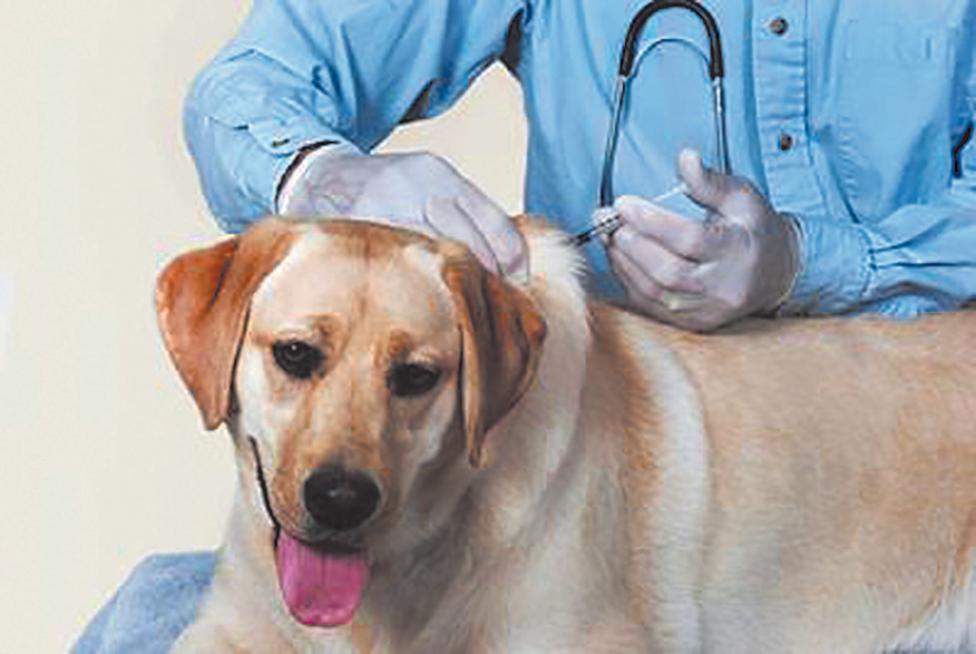
To pre-register online for the Town of Portland clinic visit: https://on.ny.gov/3KjT7Hj.
There are a limited number of spots available at these clinics, so pet owners should pre-register online as soon as possible. If you register, but decide not to attend the event, please cancel your appointment so the spot is available for another pet. You can cancel appointments via the confirmation email you receive when you register. Walk-ins may be accepted, but are not guaranteed.
At the clinic, vehicles will enter and follow the established traffic pattern on-site. Pet owners will stay in their vehicles with their pets, unless otherwise instructed. Pet owners must bring previous rabies vaccination records for each animal receiving a shot to ensure proper and effective vaccination; clinic staff will confirm previous rabies vaccination records. All dogs must be on a leash. All cats must be in a carrier. Animal handlers will transport animals from the vehicle to the veterinarian for vaccination. New York State Public Health Law requires each dog, cat, and domesticated ferret over the age of four months be vaccinated against rabies. County residents are encouraged to be responsible pet owners by having their pets vaccinated. Rabies is a very serious disease of warm-blooded animals caused by a virus. Raccoons, bats, skunks, and foxes are common disease carriers. The virus is transmitted to humans and animals through saliva and can enter the body through a bite, scratch, or open cut. The rabies virus infects the central nervous system and can cause brain swelling and ultimately death within days of the onset of symptoms. For more information about the clinic and rabies in general, visit https://chqgov. com/environmental-health/ rabies-prevention or contact Chautauqua County Health Department at (716) 753-4481.
CCE-Chautauqua
Announces Upcoming L.E.A.F. (Learn. Empower. Achieve. Farm.) Workshops
-BY CASSANDRA SKAL, AGRICULTURE PROGRAM COORDINATOR
JAMESTOWN, NEW YORK (March 31, 2023) -- Cornell
Cooperative Extension of Chautauqua County’s Agriculture Program will offer 4 workshops over the next two weeks as part of their 2023 Spring L.E.A.F. (Learn. Empower.
Achieve. Farm.) Workshop Series. The L.E.A.F. Workshop Series is open to the general public, including homesteaders, beginning farmers, established farmers looking to diversify and grow, agriculture enthusiasts, and everyone in between! The 2023 Spring LEAF series is providing 22 workshops to be held in March, April, and May.
“Business Planning for Beginning Farmers” will be the topic on Monday April 10th, to be held from 6:00-8:00pm at the JCC (Jamestown Campus) Carnahan Center, Room 123. Business plans for farms are often viewed as yet another chore to do, and usually result in dusty binders taking up space on the office shelf. This discussion-based workshop will walk you through the mental exercise of planning your future agricultural adventures. Participants will leave with a better understanding of the use of a business plan, the essential components, and a “to-do” list of things to think about to inform future planning efforts. Additional opportunities for one-on-one follow up will also be offered. FSA Borrower credits may be made available for your attendance. This workshop will be taught by Katelyn WalleyStoll, Team Leader and Farm Business Management Specialist from the Southwest New York Dairy, Livestock, and Field Crops Program with Cornell Cooperative Extension. She is a graduate of Cornell University with a degree in Animal Science and Ag Business Management and owns and operates a diversified livestock farm. The fee for this workshop is $5 per person.
“Part 1 of 4 Wool Series:
Preparing Raw Wool for Use” will be held on Thursday, April 13th from 6:00-8:00pm at the JCC (Jamestown Campus) Carnahan Center. Do you have sheep? Are you interested in fiber sourced from sheep, llamas, alpacas? Want to learn how to prepare raw wool for spinning, felting, or any other of the wide range of uses for wool? This is the beginning of a great wool series! This is the first workshop of four being led by Victoria Boehmer. In this workshop we will learn how to take raw wool and clean it and create roving which is what is used for most wool creations.
Victoria Boehmer is a passionate fiber artist, teacher, and designer based in Pennsylvania. She is the owner of Tybout House, a local yarn store and fiber arts hub in Warren, PA. In addition to the yarn store, she and her family run Dragonwood Ranch, a small farm with Shetland Sheep. Victoria loves teaching, including all steps in the fiber production process: from sheep to finished product! At Tybout House, she and other enthusiasts practice a variety of fiber arts, and they are always eager to share their passion with others. Bring questions and be prepared to work with some raw fiber! We will have some wool provided but if you happen to have some laying around don’t be afraid to bring it with you! The fee for this workshop is $5 per person.
“Sewing 101” will be held on Wednesday April 19th from 6:00pm-8:00pm at the JCC (Jamestown Campus) Carnahan Center. Are you adult that wants to learn some sewing basics while creating a beautiful handmade apron? Join Nancy Johnson, 4-H Leader/Teacher, in making a 30 minute apron that will teach you how to read a simple pattern, cut out fabric, pin, sew straight lines, gather fabric, add trim, and much more. This is a great project for many levels and all are welcome! The fee for this workshop is $5 per person and does require you to bring a few supplies.
Biosecurity On The Farm” will be held on Saturday, April 22nd, from 10:00am-12:00pm at Bit-O-Breeze Farm in Jamestown, NY. Bit-O Breeze farm is a local pork producer that is committed to providing quality meat to consumers. Bio security on a farm is often overlooked but is a highly important step for your farms safety and wellbeing. This applies to farms that have animals, veggies, and/or field
Audubon Announces Judges for 2023 Nature Photography Contest
crops. Some pests are so small that they can hitchhike on your boots or clothing without you even knowing they are there! Come learn and see some biosecurity initiatives that BitO-Breeze farm is following to ensure the safety and health of their pig operation! Please dress to be outside and in a pig barn facility. Please be sure to wear clean clothes that have not been in contact with other animals, especially pigs. Boot sanitation will be provided. Each workshop will be 2 hours long and led by an experienced instructor. The LEAF workshops are designed to be interactive, so participants are encouraged to bring their questions and ideas to this collaborative environment!
Pre-registration is required prior to the workshop to allow for adequate time to prepare printed resources and materials. Interested participants can register online by visiting https://chautauqua.cce.cornell. edu/agriculture/leaf-2023 or by emailing cks83@cornell.edu, or by calling 716-664-9502 Ext 202.
The Agriculture Program is one of many programs offered by Cornell Cooperative Extension of Chautauqua County (CCEChautauqua). CCE-Chautauqua is a subordinate governmental agency with an educational mission that operates under a form of organization and administration approved by Cornell University as agent for the State of New York. It is taxexempt under section 501(c)(3) of the Internal Revenue Code. The association is part of the national cooperative extension system, an educational partnership between County, State, and Federal governments. As New York’s land grant university Cornell administers the system in this state. Each Cornell Cooperative Extension association is an independent employer that is governed by an elected Board of Directors with general oversight from Cornell. All associations work to meet the needs of the counties in which they are located as well as state and national goals. For more information, call 716-664-9502 or visit our website at www.cce.cornell.edu/ chautauqua. Cornell University Cooperative Extension provides equal program and employment opportunities.
Jamestown, N.Y. – A panel of four judges will choose the Adult and Youth winners in the categories of Animals, Plants and Landscapes in the Audubon Community Nature Center (ACNC) 2023 Nature Photography Contest. All winners receive a $200 cash prize.

Three honorable mentions will also be named.
Two additional $200 cash prizes are awarded for the Adult and Youth photos receiving the most Community Choice votes online. A photo could receive both the Community Choice and a judged award.
Full details of the competition are at GoGoPhotoContest.com/ ACNCPhotoContest2023, where you can submit photos and see the 2022 contest winners.
Judging the entries will be Ron Durant, Wanda Krack, Tom Morack and Bill Smith. With decades of experience as photographers, all have judged photography contests as well. Details of the background of each can be found on the Judges page on the competition website.
ACNC will print the winning photographs to exhibit in the Nature Center. Winning and honorable mention photographs will be displayed on the contest website and announced in a widely distributed news release.
The sooner photographs are submitted, the longer the public can vote for them for the Community Choice awards. Photographers are reminded to encourage friends and family to vote for their photo(s). All the social media buttons are there for postings.
Deadline for submissions is Sunday, July 2, 2023.
Audubon Community Nature Center builds and nurtures connections between people and nature by providing positive outdoor experiences, opportunities to learn about and understand the natural world, and knowledge to act in environmentally responsible ways. To learn more, visit AudubonCNC. org.
Easter egg hunts and other eggceptional traditions
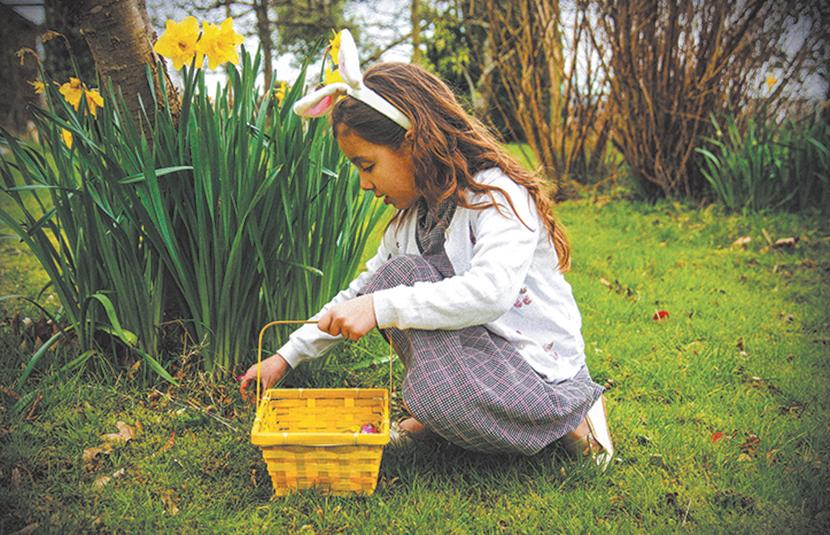
Easter is celebrated in various ways. Traditional religious commemorations include Saturday evening Easter vigils and Sunday morning Resurrection masses. Parents may spend Easter weekend putting the finishing touches on Easter Bunny baskets, and many families favor a combination of traditions.
Chautauqua County Officials Warn of the Presence of Xylazine in the Local Illicit Drug Supply
Mayville, N.Y.: County officials are monitoring the emergence of a dangerous substance in the local illegal drug supply. Xylazine, a non-opioid veterinary tranquilizer not approved for human use, is being found mixed with fentanyl and other opioids in communities nationwide. Added to these street drugs to extend their effects, xylazine (“tranq”) also increases the already serious risk of a drug overdose. Because it is not an opioid, xylazine does not respond to naloxone (Narcan®), the opioid overdose-reversing medication. Repeated use of xylazine is also associated with severe skin ulcers, abscesses, and related complications.
“Xylazine is making the deadliest drug threat our country has ever faced, fentanyl, even deadlier,” Drug Enforcement Administration (DEA) Administrator Anne Milgram said in a recent agency alert. Media reports have indicated the discovery of xylazine in cities nationwide, including in 90% of Philadelphia’s street drug supply. In the Chautauqua
County region, lab analyses of drugs seized by local law enforcement agencies have also discovered the presence of xylazine.
“Xylazine threatens to intensify an already severe overdose problem in our county,” said Dr. Michael Faulk MD, Chautauqua County’s Chief Medical Officer and Department of Health Director. “County residents are warned that using any street drug is dangerous and potentially deadly.”
Resources to help those struggling with substance use can be found at CombatAddictionCHQ. com. Individuals who continue to use illicit drugs are advised that naloxone, while ineffective against xylazine, does still reverse the effects of opioids present in someone experiencing an overdose. Local sources of naloxone can be found at CombatAddictionCHQ.com. Resources such as the National Overdose Prevention Lifeline at neverusealone.com are also available.
Around Town
Dingus Day Dinner
Come and have some fun, Dyngus Day Dinner Monday April 10,2023, from 5pm-8pm. Enjoy Crockski"s pierogis, Polish sausage, mashed potatoes, sauerkraut & dessert at Firehouse on the Lake 23 Jackson St. Silver Creek NY Tickets available at the bar of the Firehouse or call Laurie- 716622-7485 or Mary Fran 716-934-4107. Sponsored by the Hanover Democratic Club
County Executive to Host Boat User Fee
Informational Meeting
Boat User Fee Informational Meeting scheduled for April 12

Mayville, N.Y.: -- In an effort to establish sustainable funding for Chautauqua Lake, as previously proposed in the Post Journal, Chautauqua County Executive PJ Wendel would like to extend the opportunity for interested stakeholders to take part in an informational meeting to be held on Wednesday, April 12th at 5:30 pm in the legislative Chambers
Since religious as well as secular imagery and traditions have melded to form the Easter most individuals recognize today, a mix of customs may be part of your Easter festivities. Among them will be colored eggs, egg hunts and possibly even egg rolls. Just how was the Easter egg tradition hatched?
Pre-Christian societies
Before Christianity was as widespread as it is in modern times, many societies associated eggs with spring and new life. Many birds and animals lay eggs early in spring, and these eggs tend to hatch upon the arrival of the warm weather, budding flowers and buzzing insects.
Ancient Persians are believed to have painted eggs for Nowrooz, their new year celebration that would fall on the spring equinox each year.
Eggs also have been part of Passover celebrations. A hardboiled egg dipped in salt water is served at a Passover seder, symbolizing both new life away from oppression and the Passover sacrifice at the Temple in Jerusalem, according to
Chabad.org.

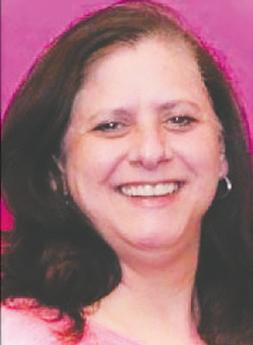
Lent, Christianity and eggs
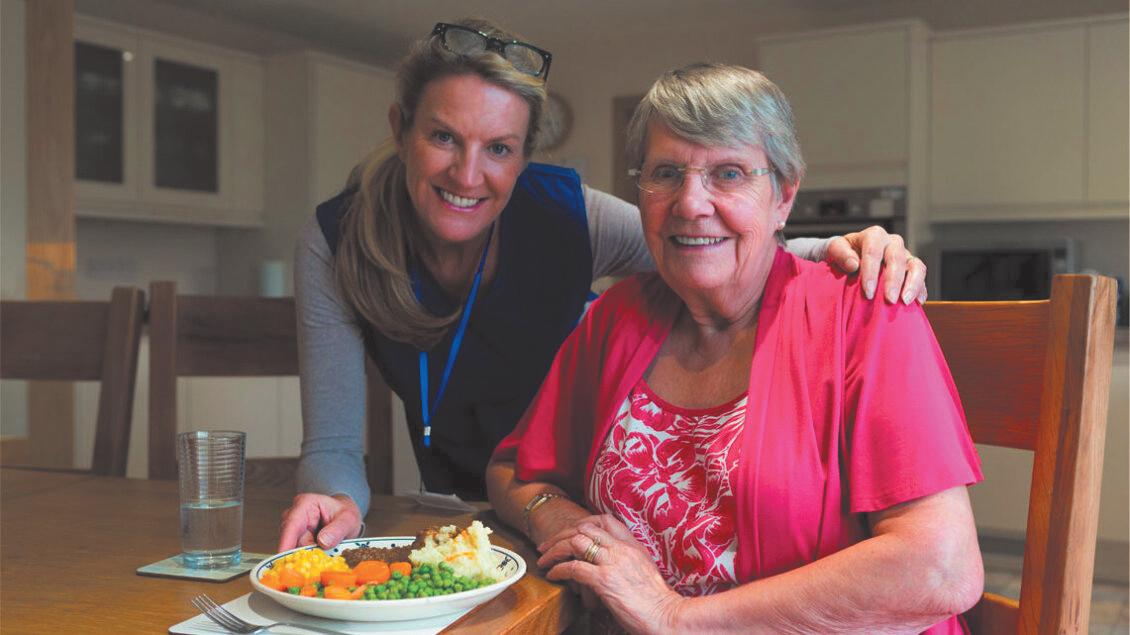
In medieval times, eating eggs was forbidden during Lent, when both dairy and meat were avoided. To reduce waste, eggs laid during Lent were boiled or preserved in some way.
The fast ended on Easter Sunday, and eggs became, once again, important and nutritious staples — especially for poor families that couldn’t afford much meat. Eggs also were given to the church by medieval English villagers and also to the lords of the manor. Royals eventually got in on the act, and decorated eggs were distributed to the household in a tradition
Roasted lamb is an Easter Sunday classic
Easter is a religious holiday that occurs each spring. Easter commemorates and celebrates the resurrection of Jesus Christ. Easter is full of symbolism, but it’s also steeped in traditions, including family meals.
Lamb is a popular Easter Sunday meal, and this recipe for “Roasted Lamb with Roasted Asparagus” from “Feast of the Seven Fishes: A Brooklyn Italian’s Recipes Celebrating Food & Family” (Powerhouse Books) by Daniel Paterna can make for the perfect Easter entrée. Lamb is most tender in spring and mild in flavor, and it pairs well with the earthiness of asparagus.
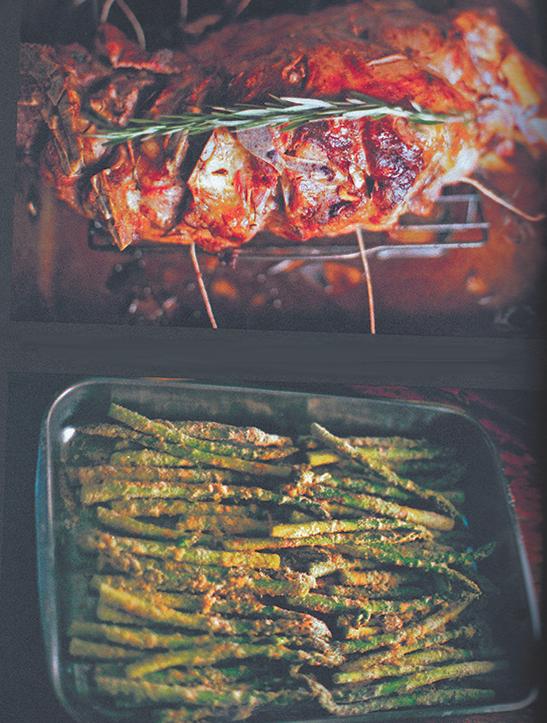
Roasted Lamb with Roasted Asparagus
8 to 10
Serves
Lamb:
1 leg of lamb or loin of lamb, about 4 to 5 pounds
5 garlic cloves, sliced
2 tablespoons olive oil
4 cups dry white wine
1 fresh bay leaf
4 sprigs fresh rosemary
4 to 5 sprigs fresh thyme
Cut small slits in the meat of the lamb with a sharp paring knife. Insert a slice of the garlic into each slit. Place the lamb in a large sealable plastic bag and add the olive oil, 2 cups white wine, bay leaf, rosemary, thyme, salt, and pepper. Seal the bag tightly and place in the refrigerator to marinate for 12 hours. Remove the lamb from the fridge the next day, at least 4 hours before roasting. Keep the lamb sealed in the marinade bag and allow it to come to room temperature. Heat the oven to 400 F. Remove the lamb from the bag with marinade. Place it on a rack in a roasting pan. Add 2 cups of wine. Roast for 11⁄2 hours or until the thermometer reads 150 to 160 F. Baste with drippings while roasting. Serve warm.
Asparagus:
4 pounds of asparagus, remove woody ends
2 cups coarse bread crumbs
1 cup grated Romano cheese
2 tablespoons garlic powder Freshly ground black pepper, to taste that was one of the earliest to include eggs.
Egg hunts and more
Some historians suggest that egg hunts can be traced back to German Protestant reformer Martin Luther, who organized egg hunts for his congregation.
The men would hide the eggs for the women and children to find.
This symbolized the story of Christ’s resurrection, when the tomb was discovered by women.
The eggs also represented Jesus’ new life and his emergence from the tomb.
Egg hunts are not the only egg-related games that were hatched for Easter celebrations.
According to the website Learn
Religions, some European children go from house to house begging for Easter eggs, like children may ask for treats on Halloween. The custom is called “pace-egging,” a term derived from the old word for Easter, “Pasch.” Egg rolls also are symbolic of rolling away the stone from Christ’s tomb. Various countries have their own rules on egg rolls. In Germany, for example, children roll their eggs down a track made from sticks. Easter eggs are an integral symbol of the holiday that hold both secular and religious meaning.
4 large eggs
Sea salt, to taste
Preheat the oven to 400 F. Place the bread crumbs, cheese, garlic powder, and black pepper in a dish or bowl wide enough to hold the asparagus. Mix well to combine thoroughly. Put the eggs in another dish or bowl of similar size and beat well. Working in batches, dip the spears into the egg, making sure they are coated well. Immediately place them in the bread crumb mixture and toss until each spear is fully coated. Transfer the breaded asparagus to a large baking sheet. Place the asparagus in the preheated oven and bake for 30 minutes or until the breading is browned and crispy. Serve with wedges of fresh lemon. in order to explore and discuss the need for Boat User Fees on Chautauqua Lake. This meeting will begin the dialogue, and discuss the formation of a committee to look into such fees being applied to Chautauqua Lake in the effort to create a dedicated funding source that would be implemented in 2024 for lake maintenance projects.
BASE Products

Dunkirk/Fredonia




